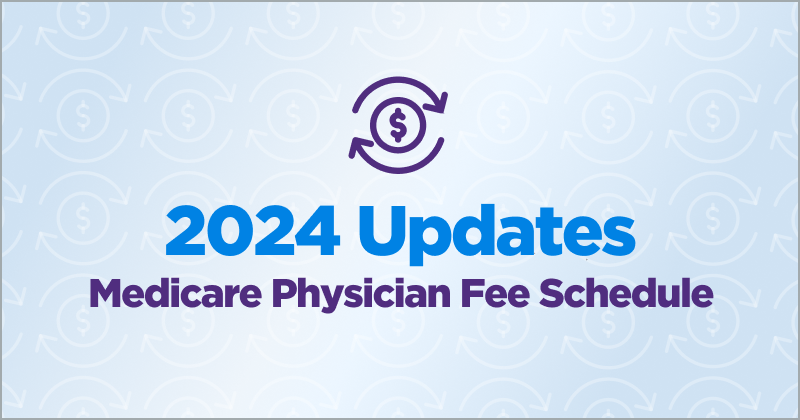Physician Fee Schedule Updates: 2024 Medicare Reimbursement Rates and New Codes

Get acquainted with changes to Medicare provider reimbursement rates that may affect you and your practice this year.
At year-end, the Centers for Medicare & Medicaid Services (CMS) releases policy proposals and updates that take effect on January 1 of the following year. Find out how your practice or ambulatory surgery center (ASC) could be substantially affected by the changes announced for 2024, including the 3.4% cut to the Medicare Physician Fee Schedule (PFS) conversion factor, which is used to determine reimbursements to doctors. In this blog, we’ll discuss a few notable changes.
2024 Physician Fee Schedule Conversion Factor
For practices that rely on revenue directly tied to Medicare reimbursements, it’s important to stay up to date with the published Medicare PFS and any revisions to payments, coverage and quality reporting requirements. In November 2023, CMS released the Calendar Year (CY) 2024 Physician Fee Schedule final rule.
Budget neutrality refers to a fiscal policy, codified by US law, that requires the Medicare PFS to maintain a generally fixed budget. In this fact sheet, CMS explains that budget neutrality affected the CY 2024 conversion factor, which was reduced by 3.4% to $32.74 from last year’s $33.89.
Need to know what current Medicare reimbursement rates are for more than 10,000 physician services? Search the Medicare PFS Look-Up tool.
Split (or Shared) Visit Definition Change in 2024
Split/shared evaluation and management (E/M) visits are visits in a hospital or facility setting that are somewhat similar to incident-to visits at a medical office. In a hospital or facility setting, a split/shared visit is one performed by a physician and nonphysician practitioner (NPP), billing in the same specialty group, under the same tax identification. Longstanding CMS policy allows for these shared visits to be billed under the physician’s NPI if the physician performed a “substantive portion” of the encounter. For CY 2022, CMS finalized the definition of “substantive portion” of the encounter as one of the following: history, exam, or medical decision-making, or more than half of the total time of the visit. For CY 2023, CMS intended to limit the “substantive portion” definition to only include more than half of the total time but delayed implementing the change in definition. Starting in 2024, CMS is defining a “substantive portion” as more than half of the total time spent by the physician and NPP performing the split/shared visit or a substantive part of the medical decision-making.
Important Practice Management Tip
ModMed users have the option to do their hospital billing in our Practice Management (PM) system. Practices should familiarize themselves with the change to split/shared visit rules to enable compliance with this new definition of a split (or shared) visit in facilities.
What to Know About Add-on Code G2211
In 2024, CMS is implementing an add-on code for the Healthcare Common Procedure Coding System (HCPCS), G2211. The G2211 add-on code is designed to acknowledge the costs incurred when clinicians serve as the continuing focal point of care for all necessary services or are involved in ongoing care related to a patient’s single, serious condition or complex condition. CMS has made refinements based on feedback to earlier proposals from the CY 2021 PFS, including specifying that add-on code G2211 cannot be billed with an E/M service that was performed on the same day as a procedural visit, i.e. a claim that includes modifier 25 on an E/M code.
CMS expects that the G2211 code will apply primarily to primary care providers, but specialty-specific physicians are also able to use this code. CMS notes that surgical specialties should have the lowest utilization of this add-on code since they are less likely to establish longitudinal care relationships with patients, but CMS stated “unequivocally” that this code is not limited to certain specialties.
Status of CMS’s Appropriate Use Criteria in 2024
Notably, CMS is not moving forward with the Appropriate Use Criteria (AUC) program covered in 42 CFR 414.94. The agency is rescinding this regulation, effectively pausing efforts to launch this program, which has been under consideration since 2020.
What might this ruling mean for your practice? Starting January 1, 2024, you no longer need to include AUC consultation details on Medicare Fee-for-Service claims. CMS maintains that it will continue ongoing efforts to pinpoint a feasible implementation approach, but no timeframe for resuming the AUC programse has been announced, and any such approach will be put forth through subsequent rulemaking.
Learn how our Practice Management software can help your practice streamline billing and coding even in the face of regulatory changes, and how our EHR, EMA®, can assist with code suggestions based on your documentation.
Telehealth Extensions and Updates to Place of Service Rules
Before the COVID-19 pandemic, stringent rules applied for Medicare coverage of telehealth visits. As part of the public health emergency (PHE), among other things, physicians were temporarily able to bill Medicare for services provided even when patients were in their homes, and telehealth became a vital way for providers to care for vulnerable patients.
Some of these emergency policies were expected to go away at the end of the public health emergency on May 11, 2023. However, CMS extended payment for CPT codes related to services listed in the 2022 Medicare Telehealth Services List. Through the 2023 Consolidated Appropriations Act and other rulemaking, certain telehealth flexibilities have been extended through December 31, 2024. CMS plans to maintain payments for telehealth services delivered to patients at home at the non-facility payment rate, equivalent to the rate for in-person office services. Through December 31, 2024, CMS will also continue to allow practitioners to render telehealth services from their homes without reporting their home address on Medicare enrollment. In the PFS rulemaking, CMS stated it would consider issues regarding home address reporting in future rulemaking and requested comments from interested stakeholders.
Staying Current with All-in-One Software
With so many changes happening each year, it can be challenging for practices to keep up with CMS reimbursement rates. By using integrated software like ModMed’s all-in-one platform to manage patient data, configure workflows and process billing for Medicare and other payers, staying current on changes could be less time-consuming for physicians and billing staff.
One significant advantage of our specialty-specific EHR platforms, EMA and gGastro®, is that ModMed regularly updates codes, including modifiers, behind the scenes. Our built-in coding suggestions are regularly updated with new coding releases — quarterly for HCPCS codes for drugs, supplies and durable medical equipment, annually on October 1 for ICD-10 codes and annually on January 1 for CPT codes.
Discover how you can get ahead of what’s new in 2024 by booking a demo.
.


